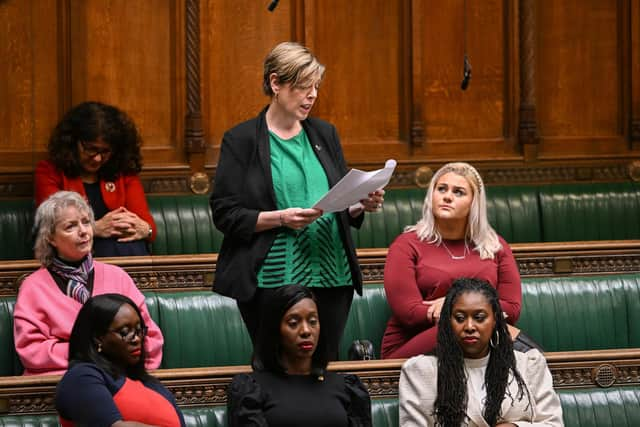The Rochdale grooming gang scandal is a reminder of how vulnerable girls are still not safe - Jayne Dowle
Here in South Yorkshire, the spectre of Rotherham still looms large; the reputation of this once-proud steel-making town, its local council (put into special measures in 2015), and community relations, were trashed by revelations that untold numbers of girls had been serially abused by gangs of Asian men.
Last month, it was reported that the National Crime Agency (NCA), which has identified and contacted more than 1,100 Rotherham victims, will no longer open any new investigations. Any arising allegations will be investigated by South Yorkshire Police.
Advertisement
Hide AdAdvertisement
Hide AdThat is not to say that the horrendous practice of groups of men plying children – many victims not much older than 13 or 14 – with alcohol, hard drugs and spurious ‘treats’ does not happen elsewhere in the UK. There have been notorious cases of organised grooming, known officially as group-based child sexual exploitation (CSE) in Oxford and Telford, for example.


In Rochdale, however, it is understood that at least 96 men – only a proportion of the true scale, it’s believed - who continue to pose a risk to children are still at large, unpunished.
A convicted leader of the Rochdale gangs, Qari Abdul Rauf, was meant to be kicked out of the UK after being jailed for six years for conspiracy to engage in sexual activity with children under 16 and trafficking for sexual exploitation.
The former-taxi driver and preacher was let out after serving just two-and-a-half years behind bars and went back to his wife and children. He was stripped of his British citizenship in 2015 and told he would be sent back to his native Pakistan, but has managed to launch appeal after appeal and is still here.
Advertisement
Hide AdAdvertisement
Hide AdMeanwhile, of the 74 children in Rochdale council files thought likely to have been sexually exploited, just three had been “appropriately protected by the statutory agencies”. How can this be right?
What does it tell us about the wider legal framework, which is meant to fight on behalf of the most vulnerable in society and bring to justice those who exploit others?
That it clearly is not fit for purpose. In Rochdale, only the actions of Maggie Oliver, a former GMP detective, and Sara Rowbotham, who led the NHS crisis intervention team, along with former-Crown Prosecutor Nazir Afzal, exposed the failings of the police and local authorities. Their fight was dramatised in Three Girls, a harrowing 2017 BBC drama which showed the toxic combination of neglect, buck-passing and political correctness which allowed horrific abuse to proliferate unchecked.
These girls weren’t just abused sexually and psychologically, they were treated as subhuman.
Advertisement
Hide AdAdvertisement
Hide AdThe official indifference is staggering. Leading Labour backbench MP Jess Phillips, in an impassioned debate on Rwanda last week, asked where Downing Street’s priorities are, claiming that the government plans to spend £169,000 per migrant deported to Rwanda while earmarking just £42 to investigate the case of each child rape victim in the UK, across the board.
It is sickening, but important to remind ourselves of what CSE actually means. The Department for Education defines CSE as occurring when: “an individual or group takes advantage of an imbalance of power to coerce, manipulate or deceive a child or young person under the age of 18 into sexual activity (a) in exchange for something the victim needs or wants, and/or (b) for the financial advantage or increased status of the facilitator.”
The scale of the abuse in Rochdale was highlighted last week with the publication of a new review that found girls, often from poor, disadvantaged white working class backgrounds, and therefore without agency, were ‘left at the mercy’ of these paedophile gangs for years.
The review, one of a series commissioned by Greater Manchester Mayor Andy Burnham, criticises Greater Manchester Police (GMP) and Rochdale Borough Council for a series of failings between 2004 and 2013 which left vulnerable young girls in the hands of organised gangs of men, mostly of Pakistani or Afghan heritage. GMP has apologised and said such cases are handled very differently now.
Advertisement
Hide AdAdvertisement
Hide AdFor the sake of vulnerable young girls in Greater Manchester, let us hope that this is indeed the case.
But the real shame is that the root causes of CSE still go unchecked. No-one in the present government has found five minutes to condemn the official failings in Rochdale and tackle the fact that the conditions which lead to CSE – cultural divides, official incompetence, poverty, the unravelling of social fabric – are allowed to proliferate.
Comment Guidelines
National World encourages reader discussion on our stories. User feedback, insights and back-and-forth exchanges add a rich layer of context to reporting. Please review our Community Guidelines before commenting.
